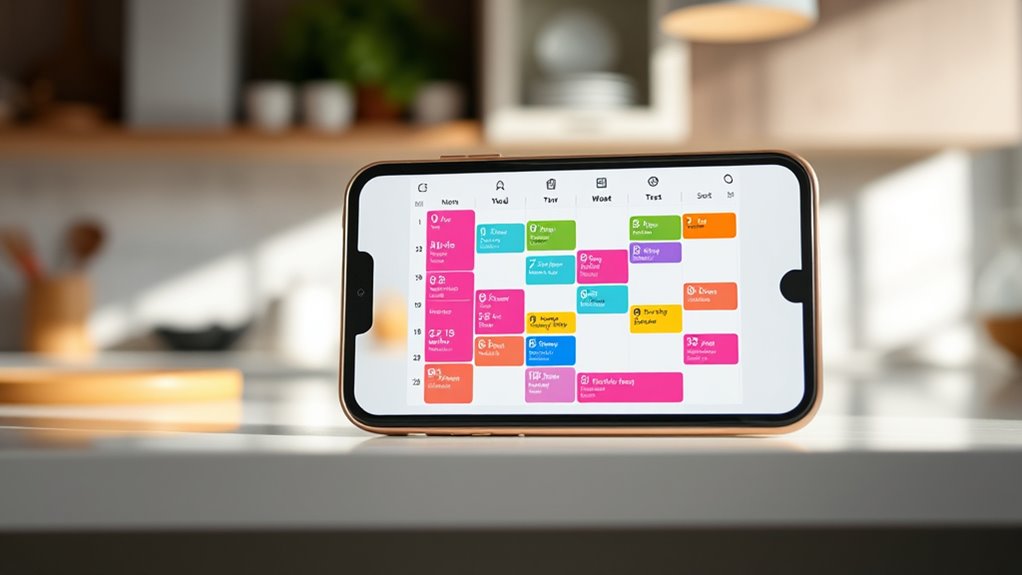A co-parent calendar sync helps you coordinate schedules smoothly by providing a shared, real-time view of plans, reducing misunderstandings and conflicts. It encourages both parents to input commitments directly, fostering trust and accountability. Notifications keep everyone updated on changes, while the documented schedule serves as proof in disputes. This app workflow turns scheduling into a cooperative process, creating a more peaceful co-parenting environment. Stay with us to discover how to make this process even easier.
Key Takeaways
- Centralizes schedules, providing real-time updates to both parents and reducing misunderstandings.
- Offers documented commitments and history logs to clarify disputes and verify commitments.
- Encourages shared responsibility, fostering cooperation and accountability through direct input.
- Enables quick updates and notifications, allowing flexible adjustments despite unexpected changes.
- Promotes transparency and predictability, creating a respectful, conflict-free co-parenting environment.

Managing shared custody schedules can be challenging, but co-parent calendar sync makes it easier. When you’re juggling different schedules, appointments, and plans, staying on the same page demands constant communication and organization. A shared scheduling app acts as a centralized hub, giving both parents real-time access to updates, reducing misunderstandings, and preventing double bookings. With everything visible in one place, you can quickly see upcoming events, track changes, and coordinate plans without endless back-and-forth messages. This transparency helps minimize conflicts and streamlines decision-making, making your co-parenting arrangement more harmonious.
Using a co-parent calendar sync simplifies conflict resolution by providing clear, documented schedules. Instead of relying on memory or scattered messages, you can refer to the app’s history to clarify commitments or resolve disagreements. For example, if there’s a dispute about who has the kids on a certain weekend, you can easily pull up the calendar and verify the agreed-upon plan. This tangible record reduces miscommunication and helps you resolve conflicts quickly and fairly. The app’s notifications and reminders also play a crucial role—alerting you and your co-parent about upcoming changes or conflicts before they escalate. When everyone stays informed, the chances of scheduling fights diminish considerably.
Clear, documented schedules help resolve conflicts quickly and fairly, reducing miscommunication and preventing scheduling disputes.
Shared scheduling through a co-parent calendar also encourages accountability. When both parents input their commitments directly into the app, it’s harder to claim ignorance or forget important dates. This shared responsibility fosters cooperation and trust, as each person actively contributes to maintaining the schedule. Plus, many apps allow you to assign specific tasks or notes, making it easy to communicate special instructions or updates, such as dietary needs or extracurricular plans. These features help prevent last-minute surprises, smoothing out the coordination process.
Another benefit of using a co-parent calendar is that it keeps everyone aligned, even when circumstances change unexpectedly. Whether a work obligation comes up or plans shift, updating the calendar promptly ensures both parents are always in sync. This adaptability minimizes frustration and last-minute conflicts. Additionally, integrating predictive modeling insights can help anticipate scheduling conflicts based on past patterns, further streamlining planning and avoiding disputes. By having a reliable, shared system, you can focus on what truly matters—your child’s well-being—rather than getting caught up in scheduling disputes. Ultimately, a well-implemented co-parent calendar sync turns what used to be a source of stress into a tool for cooperation, making your shared custody arrangement more predictable, respectful, and conflict-free.
Frequently Asked Questions
How Secure Is the Data Shared Between Co-Parents?
You might wonder how secure your shared data is between co-parents. Rest assured, most apps use data encryption to protect your information during transmission and storage. Additionally, they follow strict privacy policies to guarantee your data isn’t accessed or shared without consent. By choosing a platform with robust encryption and transparent privacy policies, you can confidently share calendar details, knowing your information stays safe and private.
Can the App Handle Multiple Children’S Schedules Simultaneously?
You’ll find the app handles multiple children’s schedules seamlessly, reducing child overlap and schedule conflicts. It allows you to add each child’s events separately, giving a clear overview of everyone’s commitments. When conflicts arise, the app alerts you instantly, helping you coordinate better. This way, you can prevent scheduling mishaps, guarantee smooth progressions, and keep all kids’ activities organized without the chaos.
Is There a Free Trial Available Before Subscribing?
You might wonder if there’s a free trial before committing to a subscription. Many apps offer a free trial so you can test features like calendar sync and scheduling. Check the app’s website or app store listing for details; they typically highlight available free trials and subscription options. Taking advantage of a free trial helps you decide if the app fits your co-parenting needs without any upfront cost.
How Does the App Notify Both Parents of Schedule Changes?
Imagine missing an important schedule change—frustrating, right? That’s why the app sends notification alerts and provides real-time updates to both parents. When you or your co-parent update the calendar, everyone gets instant notifications, ensuring you’re always on the same page. These alerts keep miscommunications at bay, making co-parenting smoother and conflicts less likely. No more surprises—just seamless coordination and peace of mind.
Can the App Integrate With Existing Calendar Platforms?
You’ll be glad to know that the app offers seamless calendar integration, making it compatible with popular platforms like Google Calendar, Apple Calendar, and Outlook. This platform compatibility guarantees you can keep all schedules in one place without juggling multiple apps. By syncing effortlessly, you stay updated on changes, reducing conflicts. The smooth calendar integration simplifies your co-parenting life, helping you coordinate plans efficiently and avoid unnecessary scheduling fights.
Conclusion
So, with co‑parent calendar sync, you’ll finally master the art of never missing a pickup or an old argument about who’s the “real” responsible parent. Say goodbye to scheduling fights and hello to a harmonious chaos—because what’s more fun than a perfectly synchronized calendar that makes everyone think they’re winning? Just remember, in the game of co-parenting, the true victory is pretending everything’s smooth sailing while secretly planning your next tactical move. Cheers to peace (or at least the illusion of it)!










